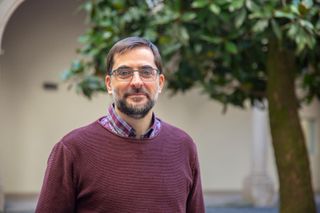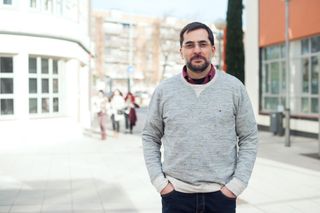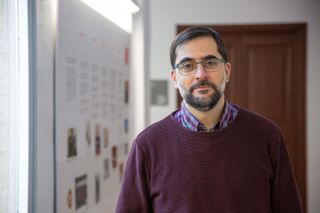Jordi Collet Sabé holds a PhD in Sociology and is a social educator and researcher in the UVic-UCC Educational Research Group. Since March 2019, he has been Vice-Rector for Research and Knowledge Transfer at this university. His tenure of this position coincides with the 25th anniversary of recognition of the university by the Parliament of Catalonia and the academic year in which UVic-UCC entered the World University Rankings of Times Higher Education for the first time, in fourth position in Catalonia and sixth in the state.
This May, UVic-UCC celebrates its 25th anniversary. Could we say that the celebration comes at a time when research is at its strongest in the institution?
Yes, without a doubt. Research at UVic-UCC has been a success story. At one point, a debate was held on whether or not it should be part of our DNA. Luckily, the answer at the time was yes. In the 2000s, several important steps were taken and from 2010 onwards research began to take good shape. The four vice-chancellors who preceded me did a very good job at implementing this commitment. Now what we are gathering is evidence of the results of 20 years of hard work.
«At one point, a debate took place on whether or not it should be part of our DNA and luckily the answer at the time was yes.»

If we look back, can we outline what research was like at the University of Vic in 1997?
We come from university schools associated with diploma courses and professions such as teaching, nursing or business sciences that have traditionally done very little research. Research had always been much more closely linked to degrees, and we taught few in the early days of the university. Therefore, our origins were not the most conducive to delving into research. This doubles the value of what has been done and achieved in just two decades.
What decisions were made to build the UVic-UCC research project?
We worked in three equally relevant areas: giving people time, creating ecosystems and obtaining resources. Because data show that it’s not the people who do the research, it’s the ecosystems, which need resources to function.
So, first, in the decade of the 2000s, hours of research began to be introduced. This normalised what for me has been the vision of the university since its medieval origins: a place where teaching staff are involved in both teaching and research equally, regardless of what is considered research in every place and at every time. For me, this means incorporating the joint construction of knowledge with the territory and people.
Second, it was understood that it is not the people who do the research but the ecosystems. Ecosystems began to be created with research groups and other contexts to bring people together (who had to have time allocated to research) and create teams.
Third, to obtain resources, it was crucial to create a Research Transfer Office (OTRI) to support researchers in calls and other procedures.
At what point is research at UVic-UCC now, in this triangle of time, ecosystems and resources?
Allocating more time is still a priority, as research hours have been increasing, but they have not yet reached the ideal levels, especially in the federated entities that have less research experience than the Vic Campus. Hence my obsession, fortunately shared with the entire Rector's Board, to increase the number of dedications to research intensification (DIRs), which we cannot grant to researchers as easily as public universities.
The current challenge is to obtain more investment, that is, to have more resources to support researchers to a greater and better extent so that they can win projects and do research in the best possible conditions. Needless to say, the key is funding: we are an underfunded university, and this has a significant impact on research. We have to resolve this, because otherwise it makes us less competitive when it comes to attracting and retaining talent.

Beyond the milestone of having entered a ranking like THE WUR in a very good position, what does it mean for UVic-UCC to be included in this ranking?
To build your own identity you need to be observed from the outside. That is why it is so important to enter one of the top three world rankings (the others are QS and Shanghai) and to be listed in such a good position. This means that we are recognized internationally, and this allows us to explain ourselves, to show that we, who are the only Catalan university outside the provincial capital, may not be great, but we do things very well. So, the bottom line is that it is crucial: it marks a before and after.
«Entering the World University Rankings marks a before and after because we have been recognized internationally, and this is crucial to building our own identity.»
And does this put pressure on the future?
It depends on how you approach it. If our challenge is to stay in the rankings, we will end up going down in the next few years and get worse results. In this type of classification, the key, and therefore our challenge, must be not to want to stay in the ranking but to grow in a very clear, decisive way with a strong strategy. From the involvement made in terms of allocated time, ecosystems and resources, we are sure to obtain a good position in the rankings, not as an objective but as a result. This helps us to demonstrate who we are in teaching, on an international scale, and in research.
But how can this be achieved?
Over the next few years, we need to ensure that at least a hundred members of teaching and research staff at FUBalmes and dozens of others in the other UVic-UCC foundations have DIRs or equivalent. Having hours of dedication is the foundation, the beginning of it all. Without these hours, the rest will not come about. Then we can afford to have slightly larger research groups and possibly stop talking about groups and start talking about departments or other broader areas dedicated to research with the people who accompany them, who support the researchers and carry out the management. And obviously we need funding. But the most important thing is that people can have hours of dedication: that is the basis. Without that, the rest cannot be achieved. Again, the three factors of time, ecosystems and resources are vital.
When we talk about ecosystems, do we also mean the existence, in the future, of research institutes with their own characteristics?
This is one of the aspects of ecosystems, without overlooking research groups, research and knowledge transfer centres (CERT), chairs, the Doctoral School, the OTRI, the library, etc. Right now, the first two priorities in this area are the BETA Technology Centre, in the field of circular bioeconomy and environmental technology, and the new Research Institute for Life and Health Sciences of Central Catalonia (IRIS- CC) in the health field. But with a longer-term view, we are also looking at the areas of gender and education. And more will come. How these ecosystems should be structured is a matter of debate, because there are so many ways to do this.
And is this the only way to retain talent?
In research, lone operators can survive for a while. But in the long run, they will want and need to network with other people. And if the institution where they are located cannot provide any colleagues, they will look outside. That is why it is so important to generate good ecosystems, with good leadership, with resources, with hours for people, with good working conditions.

A few years ago, research could be understood as a complement to teaching, and now it is the other way around. What has changed this approach?
Many of the requirements to be a lecturer (to have research credentials, to hold a PhD, to have six-yearly increments) and to obtain study accreditations and verifications are achieved with research. In other words, in order to teach, it is essential to do research, unless you have the profile of an associate lecturer who teaches because of your professional expertise. There are still people who find research a nuisance, but gradually we have to internalize the new dynamics and change our organizational structure, which has been constructed with teaching faculties in mind.
«The construction of critical citizenship can only be achieved by asking questions and asking ourselves questions, which is what research does»
How do we encourage students to do research? Do we need to do this?
If we consider that a goal of the university is to construct critical citizenship, with people who look beyond fake news, who can jointly construct alternative realities or rebel against current social or economic models, then we must make a commitment to teaching students to think in an independent way or we will not achieve this. This can only be done by asking questions and questioning ourselves, which is exactly what research is all about.
We need to change the model of school and university as transmitters of knowledge that we still have in our country. We need to teach students more than we do now to gather evidence, build and defend our own compositions, take on challenges, solve problems, articulate knowledge, etc. In building this new learning model for critical and empowered citizenship, research can help a lot. It is our duty as a University.
And what role does knowledge transfer play?
The historical distinction made between basic and applied research, which is where the current distinction between research and knowledge transfer comes from, has been blurred. Why should action research in which seventeen schools jointly construct knowledge be considered to be less valuable than an analysis of 25 surveys? For me they all have the same value and therefore I understand that research and joint knowledge are the same. In this case, transfer is understood more as a model of consultation and support. And all this should be achieved without overlooking the role that dissemination must play, to explain everything that we have built in the territory, for the territory and, often, with the territory.